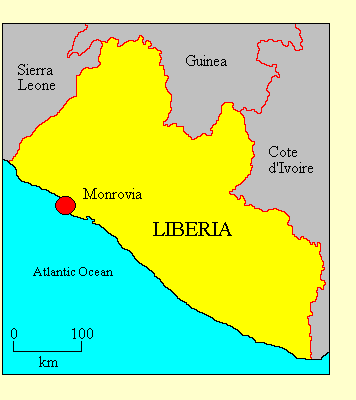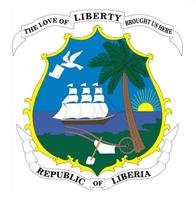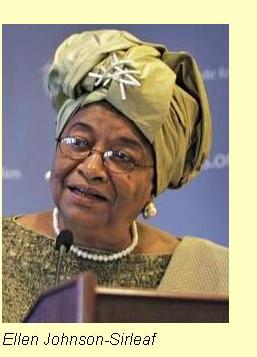

REPUBLIC OF LIBERIA
• Official name: Republic of Liberia
• Location: West Africa
• International organisations: African, Caribbean and Pacific Group of States, African Union, Non-Aligned Movement,
United Nations
• Borders: Cote d'Ivoire, Guinea, Sierra Leone
• Coastline: Atlantic Ocean
• Land area: 111,370 Km2
• Population: 3,200,000
• Annual GDP (PPP) per capita: US$500 (2009 CIA estimate). World ranking: 191. On this index Liberia is the
fourth-poorest country in the world.
• Ethnicity: Almost the entire population is of African descent, but there is a distinction between "indigenous"
African peoples (including the Kpelle, Bassa, Gio, Kru and many others), and the Americo-Liberians (about 5% of the population), who are descendants of freed slaves from the United States and the Caribbean.
• Languages: English is the official language and the language of government, business and communications.
It is spoken by about 5% of the population as a first language, and most of the population use Liberian Pidgin English as a
second language. The major African languages are Kpelle (18%), Bassa (13%), Dan (7%), Klao (7%), Mano (7%) and Loma (5%).
• Religion: Indigenous beliefs 40%, Christian (mostly Protestant) 40%, Sunni Moslem 20%
• Form of government: Presidential democratic republic. Liberia is divided into 15 counties.
• Capital: Monrovia
• Constitution: The Constitution of the Republic of Liberia came into effect on 6 January 1986.
• Head of state: The President, elected by direct universal suffrage for a six-year term.
• Head of government: The President, who appoints all ministers.
• Legislature: Liberia has a bicameral legislature, the Parliament. The House of Representatives has 64 members, elected
for six-year terms from single-member constituencies. The Senate has 26 members, elected for nine-year terms from two-member
constituencies. (The legislature has no website.)
• Electoral authority: The National Elections Commission administers national
elections.
• Freedom House 2011 rating: Political Rights 3, Civil Liberties 4
• Transparency International Corruption Index: 33% (87 of 178 countries rated)
• Reporters Without Borders Press Freedom 2010 Index: 77.5% (84 of 178 countries rated)
• Heritage Foundation Economic Freedom 2010 Index: 46.5% (160 of 179 countries rated)
Political history
Liberia was founded in 1820 as a place of refuge for freed slaves from the United States and the Caribbean, whose
descendants are today's Americo-Liberians. The area was a de facto American colony, governed by agents of the American
Colonisation Society, until 1847, when it made a formal declaration of independence as the Republic of Liberia. For 133 years
after independence, Liberia was a poor but peaceful one-party state ruled by the Americo-Liberian-dominated True Whig Party.
William V S Tubman, President from 1944 to 1971, was the best-known Liberian leader of this period.

In April 1980 the indigenous Liberians seized power, led by Master-Sergeant Samuel K Doe and his People's
Redemption Council. Doe ruled as a military dictator until 1989, when rebel forces led by Charles Taylor
invaded the country from Sierra Leone, overthowing and killing Doe. Civil war then raged until 1996, during which
time up to 150,000 people were killed and 700,000 fled the country. In 1997 order was restored and Taylor,
leader of the National Patriotic Front of Liberia, was elected president in reasonably free elections. His authoritarian rule
led to a renewed conflict and he was deposed in 2003. He is now facing war-crimes charges at The Hague. After a period of
transitional government
Ellen Johnson-Sirleaf was elected President in peaceful
elections in October 2005. She was comfortably re-elected in 2011 after the opposition boycotted the second round of the
election.
Freedom House's 2011 report on Liberia
(which was written before the 2011 election) says: "Liberia is an electoral democracy. The 2005 presidential and legislative
elections were considered free and fair by international observers... Political parties continue to be challenged by weak
organisational capacity, a lack of consultation with constituents, and the dominant role of key personalities and ethnic
affiliations... Anticorruption efforts were stepped up in 2010, with the Liberian Anti-Corruption Commission (LACC)
investigating at least eight high-level cases and recommending several suspects for prosecution...
Since the expulsion of former president Charles Taylor, the media environment has become decidedly more open...
Freedoms of assembly and association are guaranteed and respected. Numerous civil society groups, including human rights
organisations, operate in the country... The justice sector suffers from a lack of public defenders, case backlogs, prolonged
pretrial detention, and prison overcrowding... Mob violence and vigilantism occur regularly, as the public generally lacks
confidence in the criminal justice system."
Updated November 2011
|

